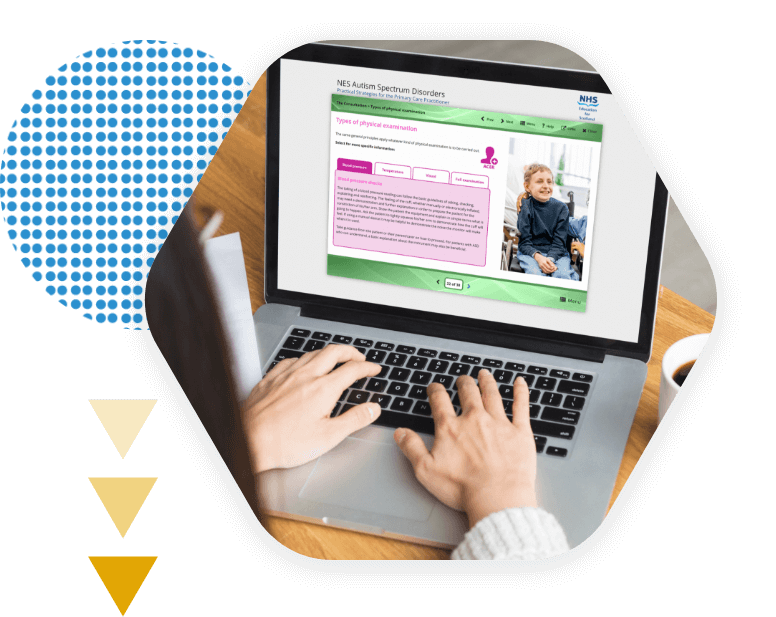Home / Case Studies / NHS Education eLearning Training Supporting Autism Spectrum Disorders
Using eLearning to Help NHS Scotland Support Autism Spectrum Disorders
Setting the Scene
NHS Education Scotland (NES) develop and deliver education and training to support NHS services. NES worked with the Scottish Government to produce a Training Framework to assist the implementation of The Scottish Strategy for Autism (2011). This strategy was put in place to ensure that Scotland is delivering quality services for people with autism and their families. Early in 2014 NES commissioned eCom Scotland to develop an eLearning training course based on their existing web-based eLearning and web resources for healthcare best practice learning resource for Autism Spectrum Disorders (ASD) and, subsequently, to redesign the website.

The Challenge
The initial challenge was to take content from the extensive ASD website and create an eLearning course. The course had to incorporate easy tracking and reporting of learner usage, as well as an assessment and certificate of successful completion. The eLearning training was aimed at any professional working in the healthcare system at the primary care level: GPs and practice nurses; allied health professionals including dieticians, occupational therapists, physiotherapists, podiatrists, and speech and language therapists; dentists and dental nurses; opticians, public health nurses; and district nurses. The course’s learning content was to focus on practical strategies to help health professionals adapt their practice - and develop best practice - to accommodate the needs of patients with ASD, and to enable the patient to relax in a clinical setting.
The Solution
eCom’s instructional designers worked with NES’s subject matter experts to develop learning objectives and identify appropriate content from the wealth of resources available. At the storyboard stage, a rigorous instructional design process ensured that the subject matter was well-structured and presented clearly, concisely, and interactively, and that the learning objectives were met. Once the storyboard (the blueprint for learning content and design) was signed off, the multimedia designers brought their creative and technical skills to building the course.
Challenges included ensuring that the technical solution was compatible with the diverse IT infrastructure in place across the NHS. A high standard of accessibility was a major requirement of the project along with usability of the course. Neither was to be compromised by technical variables such as connectivity, bandwidth, or software. The course, Autism Spectrum Disorders: Practical Strategies for the Primary Care Practitioner, presents a complex and comprehensive topic clearly and concisely. It includes a range of interactivities to engage the user and features a series of case studies to highlight and illustrate the learning points. There are knowledge checks to reinforce key messages, and a glossary and links to further resources.
The eLearning training course is available throughout the NHS via their Learning Management System. During the development of the eLearning it was decided to update parts of the ASD website to reflect current terminology and design. Following on from the eLearning training, eCom updated and restructured the website content, and rebranded the site to align with the eLearning course design. The up-to-date website provides a comprehensive reference resource to complement the eLearning.


The Benefits
There is easy access to eLearning training in the workplace and learners can complete at times convenient to them. Health professionals who have completed the course now have the knowledge to implement practical strategies for adapting their routine practice for people with ASD, and their family and carers. Signs of ASD can be identified and recognised and patients with ASD are provided with the support they need. Use of the course can be tracked and reported on, providing statistics to inform and support quality improvement in service provision and health outcomes.



